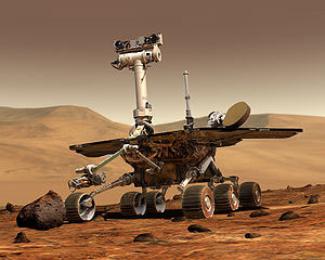The Thought Process
Wed, 01 Aug 2012 12:10:00 BST
Professor Lee McCluskey and a £16 million project to create thinking robots
 UNIVERSITY of Huddersfield scientists are playing a central role in a £16 million research project designed to ensure that the UK leads the world in the development and deployment of robots that can “think” for themselves and adapt to unfamiliar circumstances.
UNIVERSITY of Huddersfield scientists are playing a central role in a £16 million research project designed to ensure that the UK leads the world in the development and deployment of robots that can “think” for themselves and adapt to unfamiliar circumstances.
Automatic drilling machines that have to make instant decisions according to conditions deep underground... underwater robotic vehicles... ‘nursebots’ that can assist patients in hospital... automated aerial vehicles that monitor national borders or detect pollution.
These are some of the futuristic technologies that are now in sight, following the decision by the UK’s Engineering and Physical Sciences Research Council (EPSRC) to make a major investment in the field.
The University of Huddersfield’s Professor Lee McCluskey (pictured above) – a leading specialist in the field of Artificial Intelligence (AI) – is in charge of one of the nine funded projects within the programme. This gives his team the chance to develop and test intelligent and autonomous system prototypes with the support of some leading international companies.
Since the initial funding decision, the project has grown, so that 19 universities are involved in the national programme. Huddersfield will take the lead role in one of the research areas – to develop the capacity for robotic machines to learn and adapt knowledge in order to make their own plans and decisions in response to situations. It will work closely with the University of Edinburgh.
Currently, says Professor McCluskey, most robotic reasoning is at a low, ‘reactive’ level, whereas human beings have the capacity to reason in both a reactive and a deliberative way.
“What we are trying to do is give deliberative intelligence to robots, so that they can learn from their environment and reason deliberatively, just like humans can.”
Difficulties in communicating with robot machines that are operating at great distances – for example, deep underground, beneath the ocean or in space – are in important motivation for the development of deliberative artificial intelligence, explained Professor McCluskey.

In the USA, NASA’s Jet Propulsion Laboratory has worked on deliberative robots such as the Mars Rover (pictured left). Now the EPSRC-funded project, scheduled to last for up to five years, aims to ensure that the UK becomes a leader in the field.
The University of Huddersfield’s share of the funding will be in the order of £368,000 and a research fellow has been appointed – Dr Lukas Chrpa, a Czech scientist with expertise in automated planning, path planning, machine learning and knowledge engineering.
Conventional robots operate according to a “domain model” encoded by engineers so that they can carry out specific tasks. When they are required to carry out a task in a new environment, they need a new domain model.
“The inefficient way is to stop the robot, open the box and engineer a new domain,” said Professor McCluskey.
But now he and his colleagues will develop robots – or agents – that that can learn from their environment.
“We want one of these agents – whether it is an underwater autonomous vehicle, the Mars Rover or whatever – to be flexible. This means it could be sent to a new environment but still be able to cope, still be able to plan and be able to reason about what it is going to do. And to do that it will update its own domain model.”
The EPSRC robotics project has now been officially launched, and industrial partners include BAE Systems, Network Rail, the UK Space Agency and leading oilfield services provider Schlumberger.
The project has been welcomed by the Minister for Universities and Science, David Willets, who commented: “Robotics and autonomous intelligent systems are areas of science in which the UK has world-class expertise, but to reap the full benefits for the economy and society we need to get better at applying the technology to industry.”







